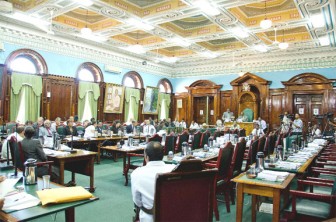The National Assembly has voted against a controversial motion which sought to institute legislation to hold persons criminally responsible for wilfully infecting others with HIV.
The motion, which was moved by GAP/ROAR MP Everall Franklin, emerged from select committee yesterday, after spending more than a year there. Chairman of the Select Committee, Health Minister Dr Leslie Ramsammy, presented the committee’s report to the House. The report was adopted by the House, in the absence of the Opposition, which again boycotted the sitting.
The motion sought to have the relevant laws of Guyana amended to make the wilful transmission of HIV from one person to another an indictable offence. In addition, it sought to have non-disclosure laws or guidelines be amended to allow for information to be used by the prosecution if so required and for hospitals, clinics and such agencies which have the results of tests and other vital information to be bound by law to release such information to any court engaged in a matter. The motion also sought to have a charge of attempted murder instituted against any individual found to have endangered the life of another in a wilful manner.

Speaking yesterday on the select committee process, Ramsammy said that after deliberating on written and oral presentations from various groups, the committee unanimously agreed not to criminalize the deliberate transmission of HIV. Franklin was unable to participate in the committee because of poor health.
“While we accepted that the wilful transmission of HIV is a problem, we do not believe that the problem can be resolved by the criminalization of HIV transmission,” the health minister said. According to him, the “criminalization of HIV transmission has not been proven to prevent the spread of HIV. It merely encourages individuals not to get tested and increases the stigma and discrimination against those who are positive.” Ramsammy contended that this, in turn, can lead to the increased spread of HIV from those who do not know their status. “The committee and those citizens and organizations that came forward to make presentations… agreed that stigma and discrimination have proven to be the most powerful drivers of the HIV epidemic.”
Ramsammy said the committee noted that most people living with HIV who know their status take measures to avoid transmission to others. He said that in earlier days, many countries driven by fear and haste, introduced criminalization laws for HIV. However, according to him evidence shows that in countries where there are no criminalization laws “more and considerable progress has been made”.
According to Ramsammy, over the past two years an increasing number of those countries have been questioning or re-considering their laws and practices relating to the criminalization of HIV transmission and exposure. He identified Norway as one such country and said that Guinea, Togo and Senegal have revised their existing HIV-related legislation or adopted new legislation that restrict the use of the criminal law to exceptional cases of intentional transmission of HIV.
Ramsammy also lauded the local response to battle HIV, saying that the country’s public health policies have been working. “The committee believes that the adoption of overly broad legislation criminalizing HIV transmission or exposure will be a major set-back in the country’s existing national HIV response, and would undermine the excellent work that is currently being done locally to address HIV,” he said.
“The premise of the motion is that a criminalization approach is necessary because the present response has failed to stem the tide of the epidemic. On the contrary, our approach to fighting the HIV and AIDS epidemic which includes a well-informed citizenry, with education and awareness at all levels throughout Guyana, prevention of HIV transmission, prevention of mother-to-child transmission, treatment and care for persons living with HIV, and pursuing policies and strategies for reducing and eliminating stigma and discrimination has worked.”
He said that in terms of the general population, prior to 2000, the population rate of HIV was between 3 to 5 per cent but during last year, this figure dropped to between 1 to 1.5 per cent.
Dr Vishwa Mahadeo also spoke on the motion and noted the substantial contributions made by members of the public. He said that if HIV transmission was criminalized, automatically anyone who was HIV positive would become a “possible criminal”. He said too that many persons who suspect they may be infected, may refuse to get tested.
Meanwhile, at yesterday’s sitting the House passed the Supplementary Appropriation (No 2 for 2011) Bill 2011 granting some $2.6 billion in extra provisions. The bill consisted of Financial Papers No 3/2011 and No 4/2011, which were last week tabled in the House by Finance Minister Dr Ashni Singh. The National Assembly also adopted the Third Periodic Report on the Parliamentary Sectoral Committee on Natural Resources. This report was presented to the House by PPP/C MP Odinga Lumumba.





